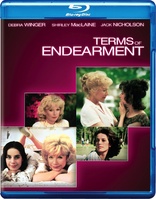Terms of Endearment Blu-ray Movie
HomeTerms of Endearment Blu-ray Movie 
Warner Bros. | 1983 | 132 min | Rated PG | Dec 03, 2013Movie rating
7.6 | / 10 |
Blu-ray rating
| Users | 4.5 | |
| Reviewer | 4.5 | |
| Overall | 4.5 |
Overview
Terms of Endearment (1983)
Aurora and Emma are mother and daughter who march to different drummers. The movie covers several years of their lives as each finds different reasons to go on living and find joy.
Starring: Shirley MacLaine, Debra Winger, Jack Nicholson, Jeff Daniels, Danny DeVitoDirector: James L. Brooks
| Romance | Uncertain |
| Drama | Uncertain |
| Comedy | Uncertain |
Specifications
Video
Video codec: MPEG-4 AVC
Video resolution: 1080p
Aspect ratio: 1.78:1
Original aspect ratio: 1.85:1
Audio
English: DTS-HD Master Audio 5.1 (48kHz, 24-bit)
English: Dolby Digital 2.0 Mono (Original) (224 kbps)
French: Dolby Digital Mono
Spanish: Dolby Digital Mono (224 kbps)
Subtitles
English SDH, French, Spanish
Discs
50GB Blu-ray Disc
Single disc (1 BD)
Playback
Region free
Review
Rating summary
| Movie | 4.5 | |
| Video | 4.5 | |
| Audio | 4.0 | |
| Extras | 2.0 | |
| Overall | 4.5 |
Terms of Endearment Blu-ray Movie Review
Indefinite Terms
Reviewed by Michael Reuben November 28, 2013The response to any film varies according to what one brings to the experience, but few films depend on the viewer's emotional baggage as much as James Brooks's Terms of Endearment, winner of five Academy Awards, including Best Director, Best Screen Adaptation and Best Picture of 1983. Brooks has always insisted that he intended to make a comedy, but in streamlining Texas author Larry McMurtry's novel for the screen, Brooks jettisoned or reduced much of the most obvious comic material centered on Texas widow Aurora Greenaway. Instead, he focused on the emotionally thorny parent/child relationship between Aurora and her daughter, Emma, and on Emma's relationships with her own children (and husband). These were complex, multi-layered relationships fraught with tension and contradiction, and Brooks repeatedly, even deliberately, violated the basic rule that comedy equals tragedy plus time. In Terms of Endearment, time is always running out. Brooks rarely allows the kind of "minimum safe distance" that makes laughter easy and fun when emotional situations turn radioactive. Many of the sharpest jokes in Terms of Endearment (if you can call them that) occur up close and in your face, when feelings are raw and exposed, and serious things are happening all around. Brooks's emotional brinksmanship isn't for everyone. It certainly didn't work for me, when I first saw Terms of Endearment as a newlywed in 1984. Preoccupied by the anxieties of learning how to be married, I related most immediately to the struggles of Emma and her husband to define the terms of their marriage, an enterprise in which they are ultimately unsuccessful. Now, with the film and my own marriage at our thirtieth anniversary, watching it is an entirely different experience. I'm better able to focus on the film's exploration of how different generations reach out to each other, sometimes connecting, sometimes missing. It's Emma who ultimately sees this dynamic most clearly at the film's conclusion, and she's the one who teaches her mother a few things she didn't even know she needed to learn.

An introductory note: I consider a thirty-year-old classic to be well beyond the statute of limitations for so-called "spoilers". The following discussion freely references major plot points in Terms of Endearment. Those who want to know nothing in advance shouldn't be reading reviews at all and definitely should not keep reading this one. In the film's opening scene, Aurora Greenaway (Shirley MacClaine) fusses over the newborn Emma in her crib, irrationally convinced that the baby has stopped breathing, while her husband (in the voice of Albert Brooks) tries in vain to reassure her from the next room. Aurora isn't satisfied until she awakens the baby and hears her cry. This contradictory mixture of smothering concern and inchoate protest will characterize Aurora's and Emma's relationship for the rest of the film. Mr. Greenaway dies while Emma is still a child, and Aurora attracts a collection of local Texas suitors, all of whom she keeps at a distance. Her focus remains on Emma (Debra Winger), but as dedicated as she remains to her daughter's welfare, Aurora seems equally indifferent to her feelings. MacLaine won the Best Actress Oscar for one of the most complex portraits of motherhood ever captured on film. Her Aurora is both a devoted mom and a fully rounded human being with quirks, desires, personality (lots of personality), hopes and disappointments. She can appear warmly emotional and brutally callous at almost the same moment, and there is hardly a scene that can't be rewatched repeatedly to observe the multiple layers with which MacLaine invests the character. Trying to describe MacLaine's Aurora is an exercise in failure; there's no substitute for meeting her. Winger's Emma is her mother's daughter, an equally strong personality whose single greatest weakness is the nagging sense that she doesn't measure up to Aurora's expectations. It's not hard to understand Emma's perspective when, the night before her wedding to Flap Horton (a young but already impressive Jeff Daniels), Aurora tells Emma to call off the wedding, because Flap isn't good enough for her. Then she boycotts the wedding. What Aurora can't comprehend is that her own assessment of Flap is irrelevant. He's Emma's choice, because Emma is eager to escape her mother's shadow and begin her own life. The bond between mother and daughter remains strong, however, and it is a source of endless frustration (and no small amount of envy) for Emma's new husband. He would no doubt say it's why he begins to have affairs, and indeed one could debate for a long time without clear resolution whether Aurora foresaw Flap's inadequacy as a husband and father or caused it by depriving him of Emma's full support. What's clear is that Aurora remains part of the Horton marriage even after Flap moves them to Iowa, where he's been offered a teaching job, and later Nebraska, where he's been offered the chairmanship of a department. Aurora's phone calls at inconvenient times are a running joke, as is Emma's willingness to take them. (When Aurora hears that they're leaving Texas, her first thought is that the phone bill will be enormous.) The bond between these two is essential to both their beings, and they take it so much for granted that they don't realize its importance until it is threatened. Which isn't to say that these two women don't pursue romance and excitement. After suffering many years of Flap's dalliances, Emma finds herself drawn into an intoxicating but guilt-ridden affair with a sweet but married banker (John Lithgow). Aurora's adventures are even more outlandish and among the film's comic high points. Having kept all suitors at bay for years, she virtually throws herself at her next door neighbor, a former astronaut and career bad boy named Garrett Breedlove (Jack Nicholson), a character invented by Brooks specifically for the film. Breedlove normally chases much younger women, and he's the shallow quintessence of everything Aurora despises, all of which makes her sudden attraction to him a surprise, especially for her. But like most people, Breedlove turns out to have unexpected facets that only gradually reveal themselves. He's a memorable presence in Terms of Endearment, and Nicholson won a Best Supporting Actor Oscar for playing an unrepentant hound dog whose moments of tenderness and sensitivity catch even him off guard (for as long as they last). The last section of Terms of Endearment is the most challenging for both the audience and the filmmakers. (Brooks discusses this at length in his commentary.) When Emma is diagnosed with cancer, the film should stop being a comedy altogether, and yet Brooks still finds ways to squeeze jokes out of an impossibly painful development. Many are at the expense of the pretentious New Yorkers Emma encounters when her friend Patsy (Lisa Hart Carroll) takes her on the trip she always dreamed of taking. Others arise from the diffidence of Garrett Breedlove, who has always retreated from Aurora wherever her relationship with Emma is concerned. Eventually, though, even a comedy, if it's about real issues, has to have a few serious scenes, and in fiction as in life, nothing focuses the attention better than the imminence of death. Emma's late scenes with her children, with whom she previously seemed to be replicating many of her mother's mistakes, reveal a depth of maternal concern and a hard-won wisdom far beyond anything Emma has displayed to date. And Aurora's final scenes are extraordinary. The woman who for so long winced at being referred to as a grandmother is now utterly transformed.
Terms of Endearment Blu-ray Movie, Video Quality 
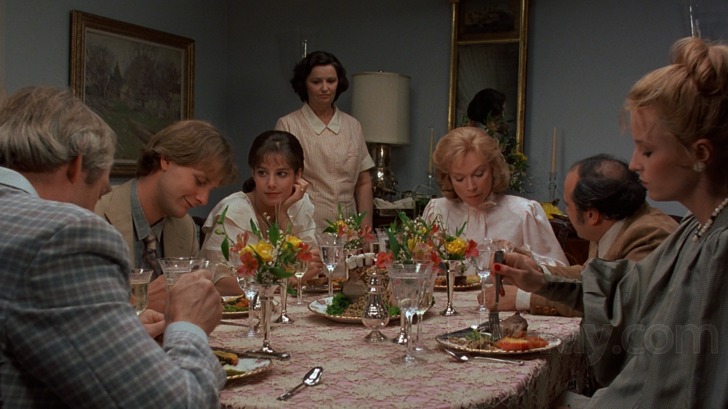
The talented Polish cinematographer Andrzej Bartkowiak shot Terms of Endearment during the period in his career when he was working primarily on dramas such as The Verdict with Sidney Lumet. (Eleven years later, he would shoot Speed and be transformed overnight into a photographer, and then a director, of action films.) A good DP delivers whatever the director wants, and Brooks, who was coming from television, appears to have wanted a well-lit, clearly visible frame without excessive stylization: a functional image with the richer appearance of a motion picture. Warner's 1080p, AVC-encoded Blu-ray, from a Paramount transfer, offers a superb rendition of Bartkowiak's photography. Except for a few opening scenes, which have been deliberately softened because they are set in the past, the image is clear, detailed and sharply defined, with a natural grain pattern that has been so finely rendered that it will barely be noticed. The color palette in and around Aurora's Texas home is bright, warm and saturated, while the look of Emma's surrounding once she relocates to the Midwest tend to be somewhat cooler and duller. But almost every scene in Terms of Endearment is clearly lit, even at night. The major exception is the initial love scene between Aurora and Garrett, where the shadows are an essential part of the comedy. Warner has opted for a compression ratio at the high end of their usual range, with an average bitrate of 26.34 Mbps. As has become their usual practice, they have left significant space on the BD-50 unused, but there was nothing in the image to indicate overcompression. Terms of Endearment has been given a gorgeous presentation on Blu-ray.
Terms of Endearment Blu-ray Movie, Audio Quality 
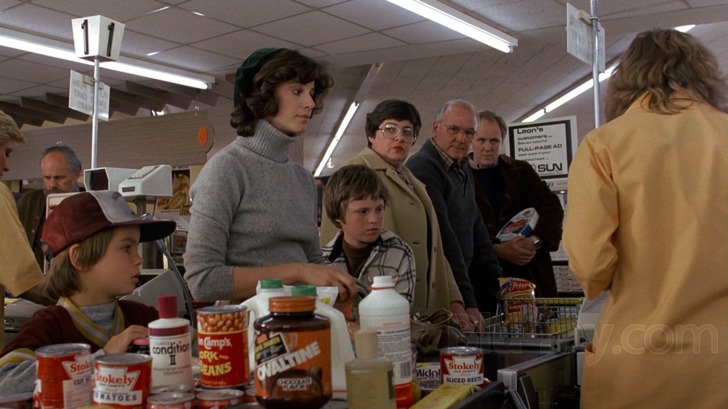
Terms of Endearment was released in mono, which is available in a two-channel version as Dolby Digital 2.0 (listed as "restored mono") with identical left and right front channels. The default audio track is lossless DTS-HD MA 5.1, which contains a very conservative remix of the mono track that retains the front-oriented nature of the mix, but uses the channel separations to give a little more authority and somewhat deeper bass extension to the score by Michael Gore (Fame). The score is essential to the film's tone, buoying moments that might otherwise become too serious. Several classic show tunes occur as source music, and they blend smoothly into the mix. The dialogue is always clear, and a few big moments (notably a drive on the beach in Breedlove's car) have strong enough sound effects to register appropriately.
Terms of Endearment Blu-ray Movie, Special Features and Extras 
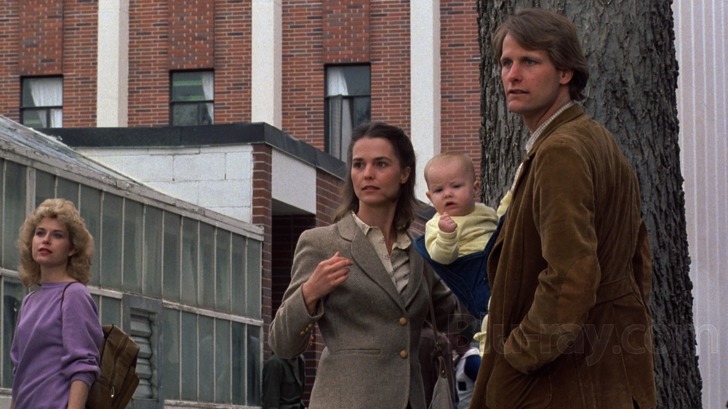
The extras have been ported over from Paramount's 2001 DVD, which has been reissued several times in different packaging.
- Commentary by Director James L. Brooks, Co-Producer Penney Finkelman Cox and Production Designer Polly Platt: Brooks notes that he hasn't seen the film for years, which suggests that the commentary was recorded for the DVD. Although Platt and Cox chime in regularly, Brooks dominates the commentary with a variety of recollections about getting his first feature film financed, casting the picture, the anxieties of a first-time director, his different experiences with each actor, changes he made to McMurtry's novel and his struggle to maintain the appropriate tone. He gives major credit to editor Richard Marks for helping him pick out the best moments in each performance.
- Theatrical Trailer (1080p; 1.78:1; 4:50): One can sense the marketing department struggling to disguise this genre-defying film as something more conventional than it really is.
Terms of Endearment Blu-ray Movie, Overall Score and Recommendation 
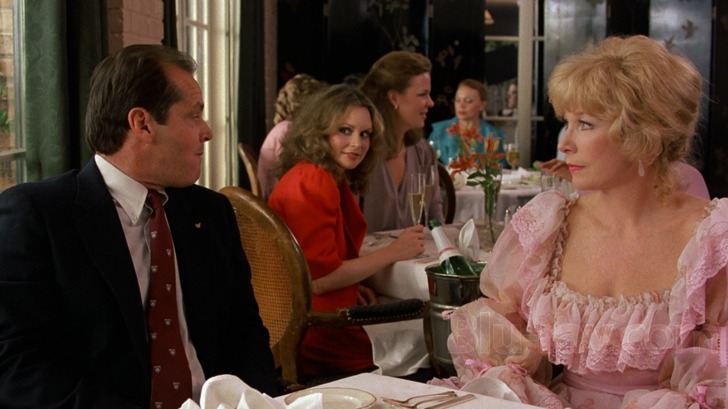
Terms of Endearment caught a lot of people by surprise when it was released, and it still has that power, because nothing about its characters or their relationships is simple or straightforward. Even Jeff Daniels' Flap Wilson, who is often relegated to the sidelines and makes decisions that appear, at first blush, to be less than admirable, is a multi-faceted character who struggles with difficult life decisions. (It's a tribute to Daniels that he makes Flap a genuine presence, with a sense that there's a real person with feelings behind the excuses, where another actor might have let him simply be the bad guy.) The film rewards multiple viewings, because so much happens between the lines (and apart from the jokes) that there's more to notice each time. The characters are all deeply flawed, but in a way that's genuine, often very funny and ultimately moving. Highly recommended.
Other editions
Terms of Endearment: Other Editions
Similar titles
Similar titles you might also like

Much Ado About Nothing
2012

Steel Magnolias 4K
35th Anniversary
1989

The World According to Garp
Warner Archive Collection
1982

How to Make an American Quilt
1995

The Rose Tattoo
1955

Imagine Me & You
2005

Something Borrowed
Movie Only Edition
2011

He's Just Not That Into You
2009

The Jane Austen Book Club
2007

Evening
2007

Millie
1931

Romeo and Juliet
2013

On Chesil Beach
2017

Me Before You
2016

Moonlight Mile
2002

The Vow
2012

The Last Kiss
2006

The Best Man
1999

Stranger Than Fiction
2006

Madame Bovary
2014
